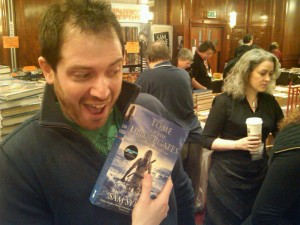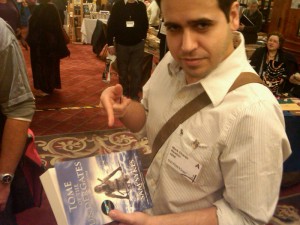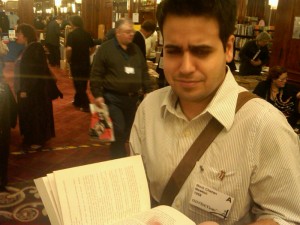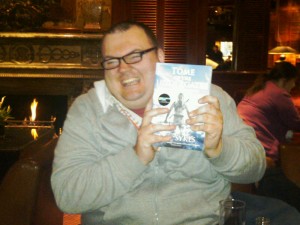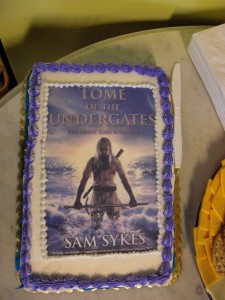Didst Thou Suck It: Fantasy and the Human Experience
(Someone is going to be pissed off by this. Someone always is.)
I’ve got a friend named Carl. As one of my friends, Carl’s jobs are mainly to listen to me talk about stupid things, complain about video games and give me advice. As an adviser, Carl’s job is to scream “WRONG, WRONG, YOU’RE WRONG, YOU’RE SO WRONG, HOW DID YOU GET THIS JOB, WHAT IS WRONG WITH YOU, I DON’T KNOW BUT YOU ARE SO DAMN WRONG, WRONG, WROOOOOOOOONG” except in a nice way and with more words.
So lately, being avid fans of both, we’ve been discussing Science Fiction and Fantasy (which largely boils down to me cursing a lot and Carl swearing to secrecy over what I’ve said) and this (para)phrase came up from my good friend:
The strength of science fiction has always been in…the exploration of fantastic ideas that are simply not conceivable in a realistic setting, but are too interconnected with the human experience to make it in fantasy.
I thought about this for awhile and liked the general idea of it. Science Fiction allows us to look at social issues from a backward perspective. The author offers a unique vision of the future (typically) that serves as commentary on the present. The outcome of the author’s story offers his solution to the issues that face us in modern society by means of showing what we’ve done right (utopia) or done wrong (dystopia). Basically, if we are at Point A, the author shows us how we reached (or will reach) Point Q. The story, in part, follows Points B through P.
I like that idea. Granted, it doesn’t apply to all of Science Fiction and some do it a lot better than others, but it was overall an idea I could get behind. It was also an idea, Carl pointed out, that made Science Fiction more “tolerable” to the mainstream crowd (for the record, I don’t give a shit what the mainstream crowd thinks, but let’s roll with it for awhile).
But, a thought occurred. He mentioned that Fantasy was inherently disconnected from the human experience. This sort of thing didn’t settle well with me, providing one of those “you’re wrong, but I’m not sure why you’re wrong” moments that I’ve only now become able to put into words.
All books provide commentary on the human experience, through the writer and the audience’s perception of the writing. This is how it is and what makes writing and reading a deeply personal experience. There’s a little bit (or 2.5 metric craptons) of the author’s viewpoint in whatever he writes. There’s some of the reader’s viewpoint in how he perceives this (yes, I know South Park might have said this in a more entertaining way, but let me finish). All writing is connected to the human experience, it’s just generally been the perception that Fantasy, with its frequently and sometimes misinterpreted moral structures and social constructs, just doesn’t have as much to say on it as usual.
This might have been true at one point, when Fantasy was chiefly about the Good Humans Who Are Beautiful and Gorgeous Because They are Good and Good Because They Are Accepted By Society against the Bad Orcs Who Are Ugly and Live Underground Because They Are Evil (even this says something about the author’s experiences, as you can probably find in one of many, many online debates).
But we haven’t had that a lot lately.
We’ve had Orcs (or Orc-like things) and we’ve had Humans. We’ve had Good and we’ve had Evil. But we haven’t really seen that construct in awhile. More often, it’s less about moral and more about motive these days. It’s about why an Orc does what he does and why people think he’s Evil for it. It’s about why the Humans are Good and whether they deserve that particular title. It’s about what we see as Good, what we see as Evil and whether or not our definitions need to change.
And this is what Fantasy has to say.
It’s hard to comment on society as it is today and be able to reach people with it. The stakes are too high and the lines are too firmly drawn. We translate our opinions to who we are and to listen to disagreement to those opinions is to compromise what we are. Sure, you might change minds (and, hopefully, you’ll change them because your arguments are sound and your evidence is clear), but a lot of the times, commentary on society as it is means you’re simply talking to people who already agree with you.
Basically, Fantasy has the potential to talk about society as it is somewhere else and provide the author with an outlet for it. It’s not so much a discussion on what will be or what might be so much as it is a commentary on what’s going on and why it’s happening. It’s a discussion of philosophies as they’re evolving, psychologies as they’re being formed and the reasons societies are rising as they do.
As loathsome as it is to speak his name, I’d cite Joe Abercrombie’s novel Best Served Cold as a good example of commentary. Particularly, the character of Shivers (my personal favorite) serves as an excellent example of society’s pressure on the individual and how he chooses to react.
Here we have a man who is good at what he does: killing. Here we have a man who is living in a time where killing is actually in high demand. The conflict occurs when we have a man who actually doesn’t want to do much killing anymore but is constantly presented with the opportunity to do so. Despite what people might say about Joe’s penchant for black endings, I think Shivers is actually a pretty good example of the optimism in people. He’s a dude who is good at what he does in a time when what he does is not only socially acceptable but the chief means of social mobility amongst other people who only want him to do what he does best and by doing so he will get what he wants…but he doesn’t want to do that.
Is it a rebellion against fatalism? Is it a discussion of how man reacts to society? Is it a discussion of what man’s ultimate fate is when he tries to resist the natural path? I got a pretty interesting conclusion out of it. I can’t share it with you, since I don’t want to spoil it for you (so read the book. Steal it if you can; he’s got enough money), but chances are you’ll come away with something very different than what I did.
And the setting by which we discuss this, Abercrombie’s world, means we can reach, in many ways, a more honest verdict than we could if we were discussing something else.
Am I reaching? I might be.
Granted, not every story has as much to say on the matter as others might. Granted, not every opinion is going to reach every ear and not everyone’s going to make the same conclusions as everyone else (or even the author). But the same can be said of any other story. This is what makes the story personal (which I already told you, you’ll recall).
But, if you’re not convinced, get five people to read a fantasy book (or steal Best Served Cold) and see what their opinions are. Then wait a month. Then make up a news story in which the same thing happens in whatever’s new and controversial in the news and see what happens.
I’m interested in seeing what everyone comes up with.
Didst Thou Suck It: Fantasy and the Human Experience Read More »
